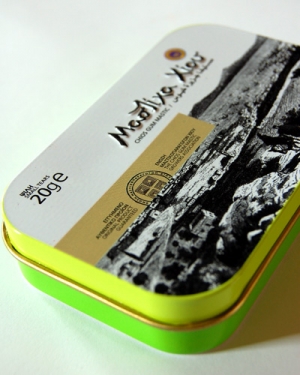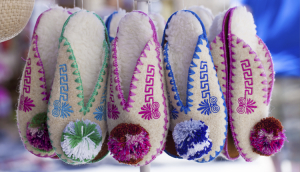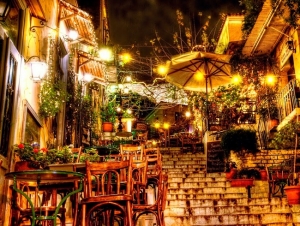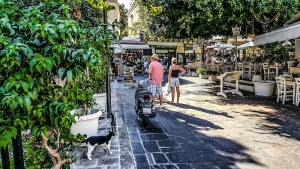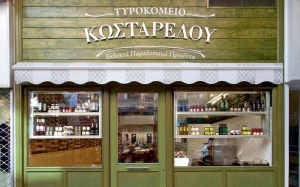XpatAthens
Mastic - Aromatic Gum Drops From Chios
 Mastic cultivation, along with its gathering and processing, takes place in all four seasons of the year and is similar to other traditional cultivations, such as the olive. And it has always been a family affair.
Mastic cultivation, along with its gathering and processing, takes place in all four seasons of the year and is similar to other traditional cultivations, such as the olive. And it has always been a family affair.
Mastic is the natural resin excreted from the trunk and branches of the schinos, the local Greek name for the mastic tree (Pistacia Lentiscus var. Chia). It is an evergreen shrub that takes 40-50 years to reach its full height of 2-3 meters. It has the potential to produce mastic five years after being planted. The tree is a resilient plant, vulnerable only to extreme cold.
 The preparation for the cultivation of mastic begins in February of each year. First, the lower braches of the tree are pruned and then they are trimmed into a specific shape, in order to enable light to reach all of the branches and to make way for harvesting.
The preparation for the cultivation of mastic begins in February of each year. First, the lower braches of the tree are pruned and then they are trimmed into a specific shape, in order to enable light to reach all of the branches and to make way for harvesting.
Summer is the season of mastic production and collection and depending on weather conditions, the season can last up to 75 days.
Villagers from the mastic towns flock to the fields to incise the tree trunks carefully with a sharp pointed tool so as not to damage the tree. "It requires respect" as mastic cultivators say, and so they do not entrust this task to casual laborers.
Immediately after the incisions are made, sap begins to ooze out and drip onto the soil beneath which has been prepared beforehand by the cultivators. The ground under each tree is cleaned of pebbles and dead leaves and is then covered with a white chalky powdered stone which helps harden the sap upon contact and makes it easy to collect the falling mastic drops. It takes 15-20 days for the drops to harden into crystalline granules ready for collection. The taste is initially somewhat bitter; however the bitterness soon gives way to a unique flavor that is much prized. The hardness of the mastic depends on the climate and atmospheric temperature, the duration of the resin's exposure on the tree outdoors as well as the size of the droplet. When a tree's flow is constant, the drop is big and rather soft while a non-constant flow gives a small but harder drop.
Collection is completed by September in the early morning hours. The workers first collect the big pieces that have formed from the drippings called pita (pie). Then they collect fat droplets and sweep the rest into sacks; finally, they collect the droplets that have remained on the branches and trunk of the tree. The harvest is stored in cool storerooms.
Later, the process of cleaning the mastic starts. This process takes months, starting at the producer's house and ending at the facilities of the Chios mastiha growers association. The cleaning of the mastic is traditionally a woman's job, particularly older women. First they sift it to get rid of any twigs, leaves and soil. Then they wash it and spread it out inside their homes to dry. Next, using a pointed knife they clean it granule by granule of any foreign matter that has stuck to it. This procedure begins in the fall and lasts until spring. Since it is a tiring and tedious job, it is performed as a group project. Each woman asks her friends to help her and they usually work for three or four hours at a time. This collaborative spirit is a custom that has long existed among the inhabitants of the villages.
Today there are two categories of mastic producers: Professional farmers who make up approximately 20 percent and those who practice another trade and produce mastic as a part-time job. The permanent residents of Mastihohoria are for the most part farmers. Mastic production slowed down between 1970 and the early 1990s but in recent years, the rise in price of mastic has reignited interest in the cultivation of the gum.
By Sarah Shaban, Arab News
From London To Athens ~ Moving For Love
Samar was Katy Perry and Norah Jones’ ‘right hand’. One day, she fell in love with a Greek, and left everything behind to come to Athens. Samar has taken off her shoes, has put on some music on her laptop and is waiting for us with a huge smile and the warmest handshake. She may only be 30 years old, but she has already managed Katy Perry, David Guetta and Norah Jones while working for EMI in London.
However, Samar means midnight whispers between two lovers in Arabic, and as it happens, love is what was meant to radically change her life, not her enormous professional success. “I was born in London to Arabic parents.
I found myself in Greece a year and a half ago because of love”, she tells us with a smile. My parents are from Iraq. They have been living in London since they were 17. Unfortunately, I’ve never been to Iraq, but my parents made sure to pass down Arabic culture and traditions to us. Holding on to their Arab roots, they gave us Arab names, they taught us to be open-hearted people, and to follow our dreams.
When I turned 18, I went to all of the record companies and told them “I want to work, give me something, I’m not interested in money”. The music industry was always my dream. I got a job at Sony interviewing musicians. At the same time, I was studying management because my parents told me that I could do what whatever I wanted, as long as I got a ‘serious’ degree. I graduated at 20 and started working at a music management company. I made coffee, tea, photocopies.. I started learning about the business and soon enough they started assigning me events that wealthy friends of my boss wanted to do. For example, one client wanted to have a party for his wife with only 10 guests.. and Sting singing live. Then I moved to EMI . I was working in the international department where each world-famous artist would need a specific person that would accompany them to their events, their shows, their interviews and photoshoots all around the world. In addition, I was the point of contact for all of the countries who wanted to book in an interview e.g with Katy Perry. I was their agenda. I was with them everywhere and always. Most of the time, it was one of the most glamorous jobs in the world. The rest of the time, it was 2am, I was in front of my computer, trying to eat and send emails at the same time. My brain was in Japan but my body-clock was still in Europe.

Of course, there were the 5 star hotels, the dinners, the parties and all of that – but there was also the jetlag, the constant running, the craziness. Think about it – we had to go to 20 countries in 2 months. I was the only constant person in the lives of the artists I was looking after. I was there to give them a sense of calm in such a chaotic whirlwind.
From the most famous artists that I looked after - Norah Jones, Katy Perry and David Guetta
– I can’t choose who was ‘the best’. And it wouldn’t be a fair thing to do being I had unforgettable experiences with all of them, and unlike some other artists, they were very nice and polite. I was closest with David Guetta because we started working together before he was famous. I was assigned to him when he was still an ‘underground’ DJ. Since my father spends his summers in Ibiza, I had heard David’s name and when I told EMI that I had heard of him, they assigned me to him immediately. I had just turned 24 and no one expected David to get so famous. For 6 months, it was just the two of us travelling everywhere. There were times when he would play in front of 50,000 people and call me to come to the side of the stage to have a look at the audience going crazy. Those are the kind of moments I’ll never forget.
The best part of the job was the annual party that happens in Miami, the Winter Music Conference. There were parties, DJs, people having a great time, we’d just hang out in Miami. I saw countries that I never dreamed of seeing. I went to Argentina, Brazil, Japan, Australia, Singapore. When I could, I’d take a few days off, and I’d stay on a little and spend some times actually seeing the countries I was in. The worst part of the job, however, was when I missed my mother’s birthday, important moments with the people closest to me. My friends just stopped calling me because I wouldn’t answer. I was so busy that I would forget to call back, and every time they would call, I was abroad. I lost touch with my friends, my life had become about my work. In the beginning, I was young, enthusiastic, free, I didn’t care. When I started realizing that I wanted to focus more on time on my personal life, I met Yannis.
I met Yannis in Tinos. When I was studying at university, there were a lot of Greeks, so I made a lot of Greek friends and I would holiday in Greece every summer. One summer, I met Yannis. It was the 6 th of July; we were like “hey, you’re great, I really like you”, everything was rosy, but then I had to go back to London. Yannis is a lawyer who lives in Greece - so when I went back to London, we both agreed that each of us had their own life and this summer-time romance didn’t really mean anything. But we kept in touch and soon enough, we realized we couldn’t stop talking. Two weeks after we met, he told me he had a few days off and suggested that we meet. I was supposed to go to Brazil and Argentina for work and I was really excited about it, so I told him it couldn’t happen because I was dying to go on the work trip. But then the trip got cancelled, so I took a few days off and suddenly found myself back in Greece with Yannis. We toured all of Western Greece together in ten days. I go back to London after the trip and again we tell each other that it’s a summer romance and it doesn’t mean anything. But then, Yannis came to London and we realized that we were kind of stuck with each other.

At first, I made an agreement at EMI that I could work one week a month from Greece. I went to my boss and told him “For 5 years I hadn’t been able to have a relationship because of work, and now I’ve found someone, I like him, and I need your help.” I explained that I needed some time for me. Everyone in the music business kind of gets it because we’re all in the same boat, so it wasn’t an issue. When EMI was put up for auction and sold to Universal and Warner Music, I decided I didn’t want to continue on and that this was my last chance to start something new in my life” she says, as she re-applies her lip gloss.
I was with Yannis for a year and a half, and I know he was never going to leave Greece because he had a good job and really loved his country. So I decided to come here permanently. I already had a lot of friends in Greece, which was really important to me. I didn’t come here just to be “Yannis’ girlfriend’. As soon as I came, I started Greek lessons. My parents thought I was crazy. But I wanted another quality of life. I knew about the crisis. But I wanted to come to Greece and offer what I could to the country, because at the same time I knew that this country had a lot to teach me. I came to Greece and I learned to be more relaxed, happier, to sit at a café with friends for 3 hours, to walk around my neighbourhood saying hi to all the locals and stopping for a chat. I came to Greece ready to let in whatever the country wanted to teach me. The only bad thing about Greece for me is that it tests my patience every day. All jokes aside though, I love Greece even though it tests my patience. The fact that my parents are from Iraq really helped me to understand and love the Greek mentality. We have a lot in common. I walk out on to my street and I know the butcher, the florist! I love all of that. Here in Greece, my friends call me just to say ‘hi’ – I still can’t believe that, that never happened in England. The weather, the people, the islands, the sun, I love everything about Greece. I totally changed my life, everything is new. I took a big risk, I don’t know if its all going to work out in the end but the truth is that in my heart I believe that I want to be here for the rest of my life, and to be with Yannis. I truly believe that.
We take a little break and Samar shows us her ‘crazy diamond’, her ‘child’, as she calls it. “Crazy Diamond is me. I started it because I wanted to do something I love and I wanted to use the experience I gathered over the last few years. A lot of people have said to me “Come for me, you’re never going to make it opening a company by yourself”. But I take the risk because I believe in myself. I bring all of the lessons I learned in London. I used to talk with many different countries in one day at EMI, and I’ve learned that you have to speak different with people in each country because every country has its own customs and cultures. I would speak differently with the team in Japan relative to how I spoke to the team in Italy. I learned to adjust to different situations. At Crazy Diamond, we organize events and we provide PR services, in a different way. One of our biggest successes was a party we organized for a very well-known baby stroller company. We brought in a barman who made non- alcoholic cocktails and served them in baby bottles, we had hairdressers and masseurs who pampered the mothers. All of this was something very different and it was a big success. We try to have fun and be different in everything that we do”. Samar talks with a lot of enthusiasm about her company, and shows us the little diamonds that are everywhere around her house. Even on the kitchen worktop there are little diamonds.

“Do you cook?”, I ask. “Once a week, my mother-in-law comes over and teaches me how to cook Greek food”. The day before yesterday she came over and showed me how to make pastitio, biftekia, keftedes and pumpkin soup. Next week she’s going to show me to how make yemista. I love it! I feel so welcomed in so many ways in Greece. Greeks are open people. I miss my family a lot but I see them often. I’m really close to my mother and she comes as often as she can. She gets on really well with my mother-in- law, they watch the same Turkish TV shows, they have a lot in common. When my mother came to Greece for the first time, she said it reminded her of Iraq and that was really touching”.
Everything sounds great, Samar hasn’t stopped smiling and talking about Yannis, Greece, and Crazy Diamond, but I’ve got a question turning around in my mind that I just can’t shake: “And if you and Yannis break up, what will you do? Would you stay in Greece?” “You know, Yannis and I were talking about that the other day. You see, he’s a pragmatist. He asked me what I’d do if we broke up. And I told him that I have really good friends here, a good life, I’ve invested time, effort, money .. and a lot of myself into Greece. So I told him that I’d stay even if we broke up because I want to be where my ‘child’ is. Then again, I might end up moving to Japan tomorrow. You never know where life is going to take you. For the meantime though, I know that I want to have my children here, give them Greek names, and to learn Greek as well as I can so that my kids don’t make fun of my accent!”
This article was originally published in Greek here: http://grekamag.gr
Capital Controls Open Acropolis To Debit & Credit Cards
Take the ticket booths at the Athens Acropolis, for instance, which will for now accept credit cards and debit cards for the first time! They’ll still accept cash, too, assuming tourists bring enough with them.
To read more, please visit: Protothema
One Day In Athens With Young Kids
I suggest a walking tour that I have often done myself with my young children. It is a realistic and real itinerary that is flexible and suitable for the whole family. It can start around 9am and ends around 7pm.
Syntagma Square
Syntagma square is our starting point. Here your family can enjoy the Greek Parliament Building. They can also witness the amazing changing of the ‘evzones’ guards at the Tomb of the Unknown soldier right. This takes place every hour, your kids will be fascinated! They will also enjoy feeding the pigeons here.
The National Gardens
From Syntagma Square it takes about 5 minutes to enter the National Gardens at the entrance on Amalias Avenue. Here your family can enjoy the little zoo, the turtle pond or have a break at the playground. Older children will enjoy the children’s library or discover the amazing selection of trees and plants in the botanical gardens.
Coffee Break
It is time for a break at Aegli Zappiou restaurant inside the National Gardens. It is a good chance to see another Athenian monument: the Zappeion Megaron. If you sit outside at Aegli, you have a wonderful view on the Acropolis. There are no cars so kids can run around on the terrace and you will still be able to see them. Aegli is family friendly and offers lots of healthy choices in both food and drinks.
To read this itinerary in full and for more of Celeste's suggestions, please visit: Family Goes Out


